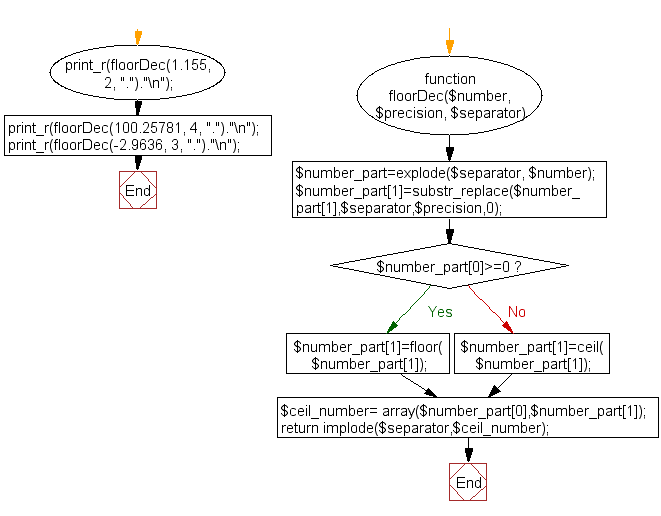PHP Array Exercises : Floor decimal numbers with precision
PHP Array: Exercise-18 with Solution
Write a PHP function to floor decimal numbers with precision.
Note: Accept three parameters number, precision, and $separator
Sample Data :
1.155, 2, "."
100.25781, 4, "."
-2.9636, 3, "."
Sample Solution:
PHP Code:
<?php
function floorDec($number, $precision, $separator)
{
$number_part=explode($separator, $number);
$number_part[1]=substr_replace($number_part[1],$separator,$precision,0);
if($number_part[0]>=0)
{$number_part[1]=floor($number_part[1]);}
else
{$number_part[1]=ceil($number_part[1]);}
$ceil_number= array($number_part[0],$number_part[1]);
return implode($separator,$ceil_number);
}
print_r(floorDec(1.155, 2, ".")."\n");
print_r(floorDec(100.25781, 4, ".")."\n");
print_r(floorDec(-2.9636, 3, ".")."\n");
?>
Sample Output:
1.15 100.2578 -2.964
Flowchart:

PHP Code Editor:
Contribute your code and comments through Disqus.
Previous: Write a PHP function that returns the lowest integer that is not 0.
Next: Write a PHP script to print "second" and Red from the specified array.
What is the difficulty level of this exercise?
Test your Programming skills with w3resource's quiz.
PHP: Tips of the Day
How to Sort Multi-dimensional Array by Value?
Try a usort, If you are still on PHP 5.2 or earlier, you'll have to define a sorting function first:
Example:
function sortByOrder($a, $b) {
return $a['order'] - $b['order'];
}
usort($myArray, 'sortByOrder');
Starting in PHP 5.3, you can use an anonymous function:
usort($myArray, function($a, $b) {
return $a['order'] - $b['order'];
});
And finally with PHP 7 you can use the spaceship operator:
usort($myArray, function($a, $b) {
return $a['order'] <=> $b['order'];
});
To extend this to multi-dimensional sorting, reference the second/third sorting elements if the first is zero - best explained below. You can also use this for sorting on sub-elements.
usort($myArray, function($a, $b) {
$retval = $a['order'] <=> $b['order'];
if ($retval == 0) {
$retval = $a['suborder'] <=> $b['suborder'];
if ($retval == 0) {
$retval = $a['details']['subsuborder'] <=> $b['details']['subsuborder'];
}
}
return $retval;
});
If you need to retain key associations, use uasort() - see comparison of array sorting functions in the manual
Ref : https://bit.ly/3i77vCC
- New Content published on w3resource:
- HTML-CSS Practical: Exercises, Practice, Solution
- Java Regular Expression: Exercises, Practice, Solution
- Scala Programming Exercises, Practice, Solution
- Python Itertools exercises
- Python Numpy exercises
- Python GeoPy Package exercises
- Python Pandas exercises
- Python nltk exercises
- Python BeautifulSoup exercises
- Form Template
- Composer - PHP Package Manager
- PHPUnit - PHP Testing
- Laravel - PHP Framework
- Angular - JavaScript Framework
- Vue - JavaScript Framework
- Jest - JavaScript Testing Framework
